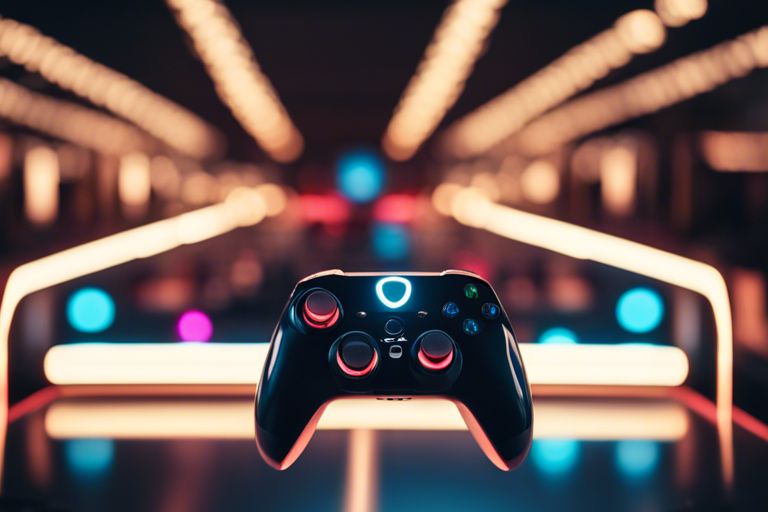Over the years, artificial intelligence has made significant strides in revolutionizing various industries, with entertainment being at the forefront of innovation. In this blog post, we explore into the impact of AI on the game industry, exploring how this technology is reshaping the way games are created, played, and experienced. To learn more about the intersection of AI and the gaming world, check out AI vs. Jobs: How AI is changing the game industry and…
Key Takeaways:
- Enhanced Player Experience: AI technology is being used to personalize gaming experiences, adapt difficulty levels, and create more immersive worlds for players, ultimately enhancing the overall gaming experience.
- Efficient Game Development: AI algorithms are streamlining the game development process by automating certain tasks like testing, bug fixing, and even generating game content, saving time and resources for developers.
- New Possibilities and Innovations: The integration of AI in gaming is unlocking new possibilities such as procedurally generated content, adaptive narratives, and advanced player behavior prediction, leading to innovative gameplay experiences that were previously unimaginable.

The Rise of AI in Gaming
To keep up with the ever-evolving gaming landscape, developers are increasingly turning to Artificial Intelligence (AI) to enhance player experiences. From creating smarter Non-Player Characters (NPCs) to generating personalized content, AI is revolutionizing the way games are designed and played. Here are some chatGPT prompt samples related to this subsection:
- "How is AI transforming the gaming industry?"
- "What role does AI play in game development?"
- "Can AI improve player engagement in games?"
Early Adoption: AI-powered NPCs
To fully immerse players in game worlds, developers are leveraging AI to create more realistic and dynamic NPCs. These AI-powered characters can adapt to player actions, making game interactions feel more lifelike. As AI continues to evolve, NPCs are becoming increasingly sophisticated, adding layers of depth and complexity to gameplay. Here are some chatGPT prompt samples related to this subsection:
- "How are AI-powered NPCs changing the gaming experience?"
- "What are the benefits of using AI for NPCs in games?"
- "Can AI make NPCs more relatable to players?"
Current Trends: AI-generated Content and Personalization
Personalization in gaming is reaching new heights with AI-generated content tailored to individual players. From dynamically adjusting difficulty levels to creating unique gameplay experiences, AI is reshaping how games are customized to suit the preferences of each player. This trend is not only enhancing player engagement but also opening up new creative possibilities for game developers. Here are some chatGPT prompt samples related to this subsection:
- "How is AI being used to personalize gaming experiences?"
- "What role does AI-generated content play in modern games?"
- "Can AI-driven personalization improve player retention in games?"
Personalization in games is not just limited to character customization; AI is now being utilized to tailor entire gaming experiences based on individual player preferences. By analyzing player behavior and choices, AI can dynamically adjust game elements such as difficulty level, narrative paths, and in-game challenges to keep players engaged and invested in the gameplay.
AI-powered NPCs are changing the landscape of the gaming industry by introducing more dynamic and responsive characters that can adapt to player actions and choices. These NPCs add a new level of immersion and realism to games, creating more engaging and personalized experiences for players.

AI-driven Game Development
It is fascinating how AI is revolutionizing game development, bringing about innovations and efficiencies that were previously thought impossible. From procedural generation to AI-assisted level design and testing, these advancements are changing the way games are created and experienced.
- Explore how AI is being used in game development.
- Discuss the impact of AI on creating immersive gaming experiences.
- Consider the future possibilities of AI in shaping the game industry.Procedural Generation: Endless Content Possibilities
Procedural
- How is AI transforming procedural generation in games?
- What are the benefits of using AI for creating endless content in games?
- Explore examples of games that utilize procedural generation powered by AI.AI-assisted Level Design and Testing
Endless
- How does AI contribute to level design and testing in game development?
- Discuss the role of AI in optimizing game levels for player engagement.
- Explore the future potential of AI in enhancing game design workflows.AI-driven game development is not just about automating tasks; it’s about pushing the boundaries of creativity and player experience. With AI’s ability to generate vast amounts of content quickly, developers can focus more on refining gameplay mechanics and storytelling. The synergy between human creativity and AI’s computational power is unlocking a new era of possibilities in game development.

The Impact on Game Industry Professionals
Despite the advancements in AI technology that are revolutionizing the game industry, there are concerns and opportunities that professionals in the field are facing. Let’s explore how AI is impacting game developers and designers:
1. How is AI changing the role of game developers?
2. What are the concerns of game designers regarding AI integration?
3. Can AI assist in creating more immersive gaming experiences?
4. What are the ethical implications of using AI in game development?
5. How can AI improve the efficiency of game testing and debugging processes?
Job Displacement Concerns: Will AI Replace Human Developers?
1. Will AI-driven game development tools make human developers obsolete?
2. How can game developers adapt to the integration of AI in the industry?
3. What roles are most at risk of being replaced by AI in game development?
4. Can AI enhance the creativity of human game developers?
5. Are there ways to collaborate with AI as a game developer?
To address job displacement concerns, game industry professionals must adapt to the evolving landscape by developing new skills that complement AI technologies. While AI can streamline certain processes, human creativity, problem-solving abilities, and emotional intelligence remain imperative in game development.
New Opportunities: AI Training and Development Specialties
1. What are the emerging career paths in AI-focused game development?
2. How can game developers specialize in AI training for game design?
3. Are there opportunities for hybrid roles that combine AI and game development skills?
4. Can AI certifications enhance a game developer's career prospects?
5. How can AI be leveraged to create innovative game mechanics and narratives?
An increasing number of opportunities are arising for game industry professionals to specialize in AI training and development. By acquiring skills in machine learning, neural networks, and AI algorithms, developers can explore new avenues in creating intelligent game systems, procedural content generation, and adaptive gameplay experiences.
1. How can game developers ensure they remain relevant in an AI-driven industry?
2. Will AI lead to a significant shift in the skills required for game development?
3. What are the key considerations for game developers looking to incorporate AI into their workflow?
4. How can AI empower game developers to push the boundaries of creativity and innovation?
5. Are there ethical dilemmas associated with AI-driven game development that developers need to address?
The Future of AI in Entertainment
Unlike traditional methods, the future of AI in entertainment is poised to revolutionize the industry in ways we have yet to fully comprehend. As technology continues to advance, the integration of artificial intelligence will redefine how we interact with games, movies, and music, shaping a more personalized and immersive experience for consumers. Here are some sample prompts related to the future of AI in entertainment:
- How will AI impact the future of gaming?
- Can AI create original music compositions for entertainment?
- What role will AI play in shaping the future of virtual reality experiences?
- Will AI-powered movies become the new norm in entertainment?
Merging AI with VR and AR: Immersive Experiences
With the merging of AI with virtual reality (VR) and augmented reality (AR), the future of entertainment is set to offer unparalleled immersive experiences. AI algorithms can be used to enhance environments, create dynamic characters, and personalize interactions, taking storytelling to new heights. Here are some sample prompts related to merging AI with VR and AR:
- How can AI be integrated into VR gaming experiences?
- What are the possibilities of using AI in creating AR storytelling experiences?
- Can AI enhance social interactions in virtual reality settings?
- Will AI-powered simulations redefine the future of entertainment in VR and AR?
AI-driven Storytelling and Character Development
Entertainment is on the brink of a storytelling revolution with AI-driven advancements in character development and narrative generation. From games to movies, AI is being used to craft compelling storylines, unique personalities for characters, and unpredictable plot twists that keep audiences engaged. Here are some sample prompts related to AI-driven storytelling and character development:
- How can AI enhance character depth and complexity in storytelling?
- Will AI-generated storylines resonate with audiences as well as human-written ones?
- Can AI contribute to creating more inclusive and diverse characters in entertainment?
- What ethical considerations arise from using AI to drive storytelling in media?
AI has the potential to transform entertainment by offering unparalleled immersive experiences and revolutionizing storytelling and character development. The future holds exciting possibilities as AI continues to push the boundaries of creativity and interaction in the entertainment industry.
Conclusion
So, AI is revolutionizing the game industry by enhancing player experiences, improving game development processes, and creating more personalized content. As technology continues to advance, integrating AI into entertainment will play a crucial role in shaping the future of gaming.
FAQ
Q: How is AI impacting the game industry?
A: AI is revolutionizing the game industry by enabling more realistic simulations, adaptive gameplay, and personalized experiences for players. Developers are incorporating AI algorithms to enhance game environments, create smarter non-player characters (NPCs), and deliver more dynamic and engaging gameplay.
Q: What are some examples of AI applications in entertainment?
A: AI is being used in entertainment for a variety of purposes, such as content recommendations on streaming platforms, facial recognition for personalized avatars in virtual worlds, and player behavior analysis to improve game design and marketing strategies. Additionally, AI-powered chatbots are being implemented in games to provide interactive storytelling experiences and assist players with in-game challenges.
How is AI enhancing user experiences in the game industry?
A: AI is enhancing user experiences in the game industry by enabling adaptive difficulty levels, personalized content recommendations, and real-time feedback mechanisms. Through machine learning algorithms, AI can analyze player data to predict preferences, optimize game mechanics, and tailor experiences to individual players, creating immersive and customized gaming experiences.

Recent Comments